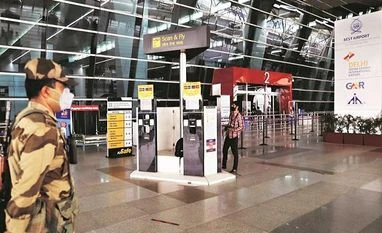The government is unlikely to impose a cap on the number of projects a private company can bid for in the upcoming round of airport privatisation, turning down the suggestion of an expert committee.
The Public Private Partnership Appraisal Committee (PPPAC) had earlier recommended restricting the number of airport projects to a maximum of two contracts in each round of auction, to prevent monopoly. But, sources told Business Standard that an empowered group of secretaries (E-GoS) has over-ruled the proposal of the government nominated panel for PPP projects, citing data in support of competition.
During the previous privatisation round in 2018 too, the government allowed entities to bid for all six airports. Gautam Adani-led Adani Enterprises emerged the highest bidder for all six airports — Lucknow, Ahmedabad, Jaipur, Mangaluru, Thiruvananthapuram and Guwahati.
The group in September also acquired Mumbai Airport from the GVK group.
Following that, the Congress had alleged that rules were tweaked to favour the Adani Group.
The committee of secretaries, while opposing the cap, has reasoned that the airports which will be privatized handle substantially less number of passengers as compared to the bigger airports. So, even if a particular company wins the bid to operate all six airports, there will be no monopoly threat in the sector.
The Airport Authority of India is likely to invite bids for privatisation of Varanasi, Amritsar, Bhubaneswar, Ranchi, Trichy, Indore, and Raipur airports in the second week of January.
The ambitious privatization plan, under which the right to manage airports will be granted for about 50 years based on a revenue sharing (per passenger) model, is also part of the government’s efforts to attract investments, add new jobs and improve infrastructure of airports beyond metro cities. The bids will be based on per passenger fee--the one who quotes the highest fee will win the bid.
“Compare the total throughput (number of passenger footfall) in the six airports handled this year with that in a major metro airport like Delhi, Mumbai or Bengaluru. The six together will be much less than one single metro airport. So, practically speaking, there is no threat of monopoly,” a senior government official aware of the discussions in the government said.
The official added that there is no logical and business reason to restrict bidders by putting a cap.
According to executives of infrastructure companies, the industry is divided on whether such a rule will be productive. A senior executive with a major infrastructure firm, which plans to participate in the bidding, said large companies may not be interested in bidding without an economy of scale.
Making profit from a smaller airport is tough unless many such airports are clubbed together and the companies have some volume of footfall to make money from, he said.
Documents related to the 2018 process, reviewed by Business Standard, show that the public-private partnership cell of the Department of Economic Affairs (DEA) had recommended that since the six airport development projects were “highly capital intensive,” a clause should be incorporated that not more than two airports would be awarded to a single bidder because of the high financial risks involved and the need for stringent adherence to performance indicators.
“The six airport projects are highly capital intensive, hence it is suggested to incorporate the clause that no more than two airports will be awarded to the same bidder duly factoring the high financial risk and performance issues. Awarding them to different companies would also facilitate yardstick competition,” the panel had noted.
However, AAI is seen to have gained from the privatisation process as Adani group had bid aggressively. According to AAI, Adanis offered Rs 177, Rs 174, Rs 171, Rs 168, Rs 115 and Rs 160 per passenger for Ahmedabad, Jaipur, Lucknow, Thiruvananthapuram, Mangaluru and Guwahati airports, respectively. The bid amount in some cases were double that of the second highest bid. In fact, the public sector unit could earn more than Rs 600 crore per year from the group.
Unlock 30+ premium stories daily hand-picked by our editors, across devices on browser and app.
Pick your 5 favourite companies, get a daily email with all news updates on them.
Full access to our intuitive epaper - clip, save, share articles from any device; newspaper archives from 2006.
Preferential invites to Business Standard events.
Curated newsletters on markets, personal finance, policy & politics, start-ups, technology, and more.
)